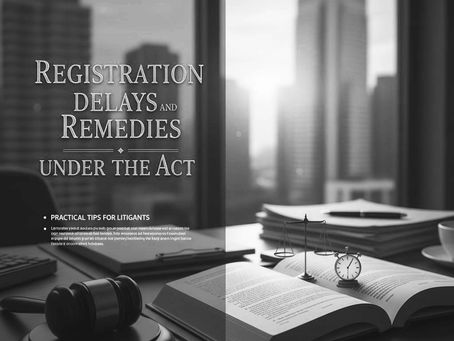top of page
Legal Blogs


Change In Nature Of Business Legal Consequences
A fundamental change in the nature of the business allows any existing partner to refuse the change and dissolve the firm. Such a change also constitutes a ground for the expulsion of a partner if it is carried out without their consent.

Lawcurb
Nov 2615 min read


Partnership In Family Business Legal Recognition
A partnership in a family business gains legal recognition through a written agreement or the conduct of members sharing profits and managing the firm. However, a registered partnership deed is crucial to conclusively establish rights and enforce terms against third parties.

Lawcurb
Nov 2512 min read


Recent Judicial Trends In Partnership Law
Recent judicial trends show a marked preference for substance over form, with courts examining the true intent and conduct of parties to determine the existence of a partnership. There is also an increasing emphasis on granting dissolution and accounting remedies to protect the rights of partners, even in the absence of a formally registered instrument.

Lawcurb
Nov 2517 min read


Registration Delays And Remedies Under The Act Practical Tips For Litigants
Registration delays can be mitigated by filing promptly and ensuring document accuracy to avoid statutory objections. Litigants may seek recourse through the civil court's writ jurisdiction to compel the authority to perform its statutory duty.

Lawcurb
Nov 2416 min read


State Variations In Registration Fees And Procedures Under The Act Comparative Overview
State-specific schedules and local bylaws create significant divergence in registration fees and mandatory procedures across India. A comparative analysis is essential to navigate these jurisdictional variances for a legally compliant registration.

Lawcurb
Nov 2413 min read


Role Of Registration In Securing Title Why A Registered Deed May Not Be The Full Story
Abstract The system of deed registration is a cornerstone of modern property law, designed to bring certainty, publicity, and state-sanctioned security to real estate transactions. For most buyers, a registered deed is the ultimate proof of ownership, a tangible symbol of a secure and indefeasible title. This article, however, deconstructs this common assumption to reveal a more complex reality. It argues that while registration is a powerful and essential mechanism for secur

Lawcurb
Nov 2415 min read


Stamp Duty Waiver Schemes (For First-time Buyers, Women, Etc.) Effectiveness In India
Stamp duty waiver schemes for specific groups provide targeted financial relief and can boost inclusivity in the property market. However, their overall effectiveness is often limited by complex eligibility criteria, a lack of awareness, and the potential for the benefit to be offset by corresponding increases in other costs like registration fees.

Lawcurb
Nov 2114 min read


Impact Of The Proposed “Replacement Bill” For The Registration Act Legal Challenges
The proposed "Replacement Bill" for the Registration Act faces significant legal challenges concerning its constitutional validity and potential infringement on fundamental rights. Its procedural ambiguities and conflicts with existing personal laws are also grounds for imminent judicial scrutiny.

Lawcurb
Nov 2115 min read


Minor As A Partner – Legal Provisions And Judicial View
A minor cannot become a valid partner in a partnership firm as the law deems them incapable of contracting. However, they can be admitted to the benefits of the partnership with rights to a share of the property and profits, but without personal liability for the firm's debts.

Theertha NM
Nov 218 min read


Digital Transactions And Stamp Duty Is The Law Keeping Pace
Current stamp laws are struggling to keep pace with the rapid evolution of digital transactions, creating significant legal ambiguities. The absence of uniform national standards for electronically signed and smart contracts leads to enforceability risks and uncertainty over the applicable state's jurisdiction and stamp duty.

Lawcurb
Nov 2015 min read


Stamp Act And Evidence Admissibility When Is A Stamped Document Mandatory
A stamped document is mandatory when an instrument, as listed in the Stamp Act, is presented as evidence before a court for any purpose. An unstamped or insufficiently stamped document is inadmissible in evidence and cannot be acted upon by any public authority until the proper duty and penalty are paid.

Lawcurb
Nov 2017 min read


How To Determine Correct Stamp Duty In A Sale Deed Checklist For Home Buyers
Home-buyers must determine the correct stamp duty by first confirming the precise market value or the agreement value of the property, whichever is higher, as per the state's Stamp Act. They should then consult the state's specific stamp duty schedule or use an official online calculator to ascertain the exact payable amount before executing the deed.

Lawcurb
Nov 2013 min read


Recent Amendment Bills Proposing Hikes In Stamp Duty Impact On Real-estate Market
Recent legislative proposals to increase stamp duty rates would raise the upfront cost of property transactions, directly impacting affordability. This could dampen buyer sentiment and slow down sales velocity in the real estate market. Such hikes may also incentivize an increase in undervaluation practices as parties seek to reduce their tax burden.

Lawcurb
Nov 1918 min read


Role Of Stamp Duty In Lease Agreements MOUs And Nonproperty Contracts
Stamp duty is legally mandatory for lease agreements and certain MOUs to make them admissible as evidence in court. For non-property contracts, it acts as a revenue tool for states and its payment is essential for the document's legal validity and enforceability.

Lawcurb
Nov 1916 min read


Stamp Duty On Online electronic Documents Current Practices And Legal Uncertainties
Current practices for stamping electronic documents rely on state-specific e-stamping or digital franking mechanisms. A key legal uncertainty is whether these digital methods satisfy the mandatory "stamping at the time of execution" requirement for validity. This ambiguity creates enforceability risks for electronic contracts, especially those executed across different states with varying laws.

Lawcurb
Nov 1914 min read


“Interim Emergency Arbitration Legal Status And Judicial Recognition in India”
While Indian law does not explicitly provide for Emergency Arbitrators, they have gained significant de facto recognition. Indian courts have generally upheld the validity of emergency arbitration proceedings and their interim orders. However, the legal enforceability of such orders remains dependent on the parties' willingness to comply, as the statutory power to enforce interim measures is currently reserved for arbitral tribunals and courts.

Lawcurb
Nov 1917 min read


E-stamp And Franking Transition In Indian Stamp Law And Practical Issues
The transition from physical stamps to e-stamping and franking in India modernizes revenue collection but faces practical challenges. These include technological barriers, lack of uniform procedures across states, and persistent confusion regarding the legal validity of these new methods compared to traditional stamps.

Lawcurb
Nov 1815 min read


State-wise Variations In Stamp Duty For Property And Agreements What A Lawyer Must Know
A lawyer must know that Indian stamp duty is a state subject, leading to significant variations in rates and regulations across jurisdictions. Correctly determining the applicable state law and its specific duty rates is essential for documenting property and agreements. Failure to comply with the specific state's Stamp Act can render an instrument inadmissible as evidence and invalidate the transaction.

Lawcurb
Nov 1814 min read


Under-stamping Risk Legal Consequences And How To Avoid Them
An under-stamped document is inadmissible as evidence in court and cannot be legally acted upon or registered. This renders the agreement unenforceable and exposes the parties to significant financial and legal risk. To avoid this, one must always calculate the correct duty based on the applicable state's Stamp Act and ensure the document is properly stamped before execution.

Lawcurb
Nov 1819 min read


Admission Of A New Partner Legal Requirements
The admission of a new partner requires the unanimous consent of all existing partners unless the partnership deed specifies otherwise. The incoming partner is not liable for any acts or debts of the firm incurred before their admission.

Lawcurb
Nov 1717 min read
bottom of page